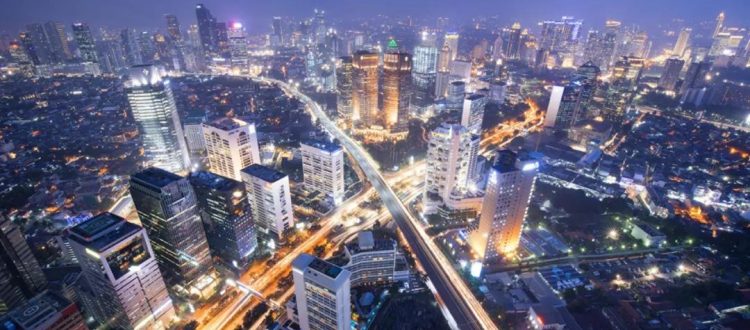Understanding Indonesia’s Place in China’s Belt & Road Affairs
While our full report and original statistical analysis will be released in early autumn, let us set a foundation to understand why Indonesia matters to China in 2018, especially in terms of the Belt and Road Initiative.
Indonesia’s growing, mixed-economy may pose several potential challenges as the country aims to achieve its low-carbon growth goals.
This post is inspired by GEI’s on-going project to investigate Chinese participation in coal-fired power plants along the Belt and Road, including Indonesia.
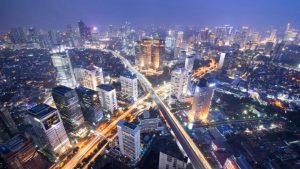
Jakarta is the capital and largest city of Indonesia
Photo Credit: Temblor.net
1. Indonesia is a major player in Asian politics and China foreign affairs
As the largest economy in all of South East Asia (World Bank) and the 4th most populous country in the world (United Nations), Indonesia has an important seat at the ASEAN table.
Furthermore, as the country was part of the 7th century Maritime Silk Road, Indonesia’s relations with China are also something not to overlook. Having officially established diplomatic relations in 1950, the two nations have mended and built-up cooperation in areas including trade, aid and infrastructure. In fact, in September 2015, China won a bid to construct a high-speed rail from Jakarta to Bandung (Financial Times).
Moving forward, the hopes to continue bilateral cooperation in the Belt and Road are mutual – as was made clear during the February 2018 Beijing meeting between Chinese Premier Li Keqiang and Indonesian Foreign Minister Retno Marsudi.
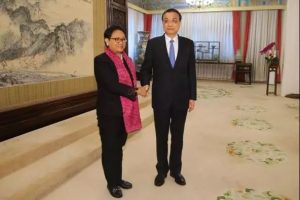
Minister Marsudi (L) and Premier Li (R) in Beijing in 2018
Source: AFP via The Straights Times
At this meeting, Premier Li was quoted as saying: “The economies of the two countries are highly complementary and the potential for economic and trade cooperation is huge.” (Xinhua)
There is also a great possibility for future diplomatic collaboration. Experts refer to Indonesia an ‘emerging middle power’ that has the potential to work with world powers.
Indonesia’s own government is also keen to work with other nations, including China, as Indonesia’s Coordinating Minister for Maritime Affairs wrote: “Indonesia is a natural partner of China in an Asia that lies at the heart of America’s Indo-Pacific project.” (SCMP)
2. Trade – a critical part of Indonesia’s economy – is tightly tied to China
Indonesia is China’s 4th largest trading ASEAN trading partner (USD 12.4 billion), with the top three countries being Malaysia (USD 22.2 billion), Singapore (USD 17.9 billion) and Thailand (USD 15.7 billion).
From the perspective of Indonesia, China is one of its most important trade partners: China is not only Indonesia’s top exporter but also the greatest source of imported goods (Straights Times, Trading Economics). According to economists at MIT, Indonesia is managing a current export of 277 products with comparative advantage to its own economy and the products’ greater market.
3. Indonesia’s energy mix is at a turning point
As a developing country, Indonesia is still relying heavily on non-renewable sources of energy for its electricity. The country has set an objective to reach 23% renewable energy by 2025 and, meanwhile, hopes to also increase overall transparency of energy sources and increase the rural electrification rates.
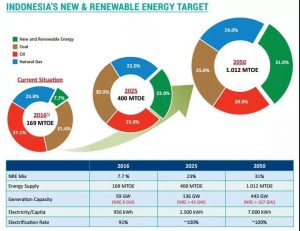
Source: Otoritas Jasa Keuangan
Once again, China has a role to play. The first stage of GEI’s research on Chinese involvement in coal-fired power projects, released last year, highlighted that a concerning amount of Indonesia’s present non-renewable energy came from coal, which involved Chinese investment.
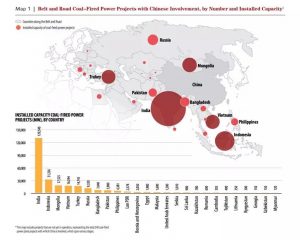
Source: “China’s Involvement in Coal-Fired Power Projects Along the Belt and Road” by Global Environmental Institute, 2017
Moreover, Indonesia’s mixed economy is greatly dependent on agriculture + industry, the latter of which is concentrated in natural materials and tourism, two sectors that are resource and energy intensive.
As Indonesia continues to grow, it will need more energy. The extent to which Indonesia can integrate renewable sources of energy and the impact of this energy mix shift on the economy are two elements of GEI’s present research… Stay tuned!

